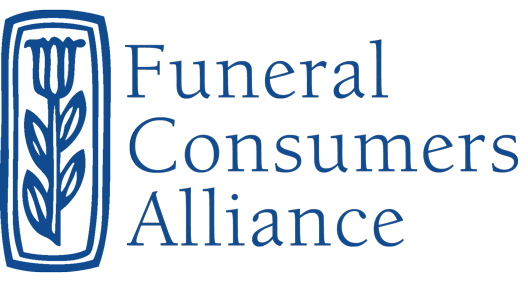Funeral Consumers Alliance Statement of Philosophical and Ethical Principles
These statements are meant to guide decisions about whether a person or entity has a financial or other conflict of interest that would make them ineligible to serve in a governing capacity on an FCA Board. While complicated cases will sometimes arise, the fundamental principles to be followed are:
- FCA’s most valuable asset is its earned reputation as a consumer advocate that is not influenced by anyone who performs work for profit in the commercial funeral, cemetery, and death-care sector.
- Conflict of interest policies must be applied consistently regardless of personal beliefs about the trustworthiness of friends or associates. It is not acceptable to exempt someone from a conflict of interest test because they are a friend or family member or someone believed to be “on our side”.
- Every person, including those of us who work or volunteer for FCA, can be compromised by a conflict of interest. A finding of a conflict of interest that prevents board service is not a judgement against an individual’s character. People of fine character are as susceptible to conflicts of interest as those with less savory motives.
- Those in the death services business who offer “alternative” death-care, such as services offered for a fee in connection with a home funeral as opposed to a service at a commercial funeral home, are subject to these policies as much as a corporate funeral director would be. There are no exemptions because we may personally like or approve of their offerings.
- Those who volunteer for non-profit community or religious entities that offer death-care services, such as but not limited to nonprofit cemeteries, religious burial societies, consumer funeral cooperatives, and others, are not considered to have a conflict of interest. Absent other conflicts, such people may serve in a governing capacity on an FCA Board.
Employees of such organizations may or may not have a conflict of interest, and these cases should be considered individually in context.
Definitions
A “funeral-related vendor” or a “member of the death-services industry”, is any entity or person that engages in the business of providing body disposition services or funeral goods, or a person who works or is affiliated with a funeral-related vendor and receives financial compensation for that work or affiliation. However, these persons or entities are exempted, and are not considered to have a conflict of interest:
- Religious burial societies that provide death-care services for congregants without a profit motivation, or on a purely charitable basis.
- Those who volunteer to administer community or religious cemeteries that provide low-cost burial services, or that provide alternatives to the commercial market such as green or natural burial. Reimbursement of incidental expenses such as travel or administrative costs is not considered “financial compensation”.
- University-affiliated anatomical donation programs, and/or comparable programs dedicated to research and the advancement of knowledge, not profit.
- Those who provide educational seminars, meetings, or materials that educate the public on funeral arrangements, consumers’ legal rights, and similar topics. If such people charge for their offerings, they must not do so while serving in a governing capacity of an FCA, which provides this education freely to the public as a matter of mission and principle.
- Clergy who perform religious ceremonies for funeral services, and who may be compensated voluntarily with a donation from the bereaved family. However, such people may not serve in a governing capacity for an FCA if they are employed or compensated by a commercial funeral home, cemetery, or similar for-profit death-care business.
- Secular celebrants who perform funeral ceremonies for compensation, except celebrants employed directly by a for-profit death-services establishment. These latter are considered members of the death-care industry and are not eligible for FCA Board service.
“Body disposition services” include all of those services for hire which deal directly with taking custody of a dead human body; body preparation for disposition; or providing body disposition, such as burial, cremation, alkaline hydrolysis, or other final disposition of the body. This term also applies to any person or entity that offers, for a fee, to complete and file necessary paperwork connected to the death of an individual (such as the death certificate or cremation permit), and to any person who offers, for a fee, negotiation of funeral contracts or prices on behalf of a bereaved family.
“Funeral goods” are goods which are sold or offered for sale for use in connection with funeral, cremation, or other final disposition services, and which are not used generally for any other purpose. For example, a casket vendor would be offering “funeral goods”, while a stationery store that offers bereavement cards would not be offering “funeral goods”.
“Position of obligation or influence” means a voting position on the FCA Board of Directors (or that of any FCA Affiliate). It also includes any position that would allow a member of the death-services industry to exert influence on FCA programs or activities in a way that would compromise the FCA’s mission to act solely in the interests of funeral consumers. FCA Boards of Directors must err on the side of caution and end any relationships that create, or tend to create, an actual or apparent conflict of interest.
FCA Board of Directors may, however, invite discussion and solicit opinions from such persons on issues of concern to FCA. FCA Boards of Directors may also collaborate with such persons on projects that benefit the interests of funeral consumers, so long as such collaboration does not result in funeral-related vendors exerting, or appearing to exert, self-interested or partisan influence on the decisions and actions of the FCA.
